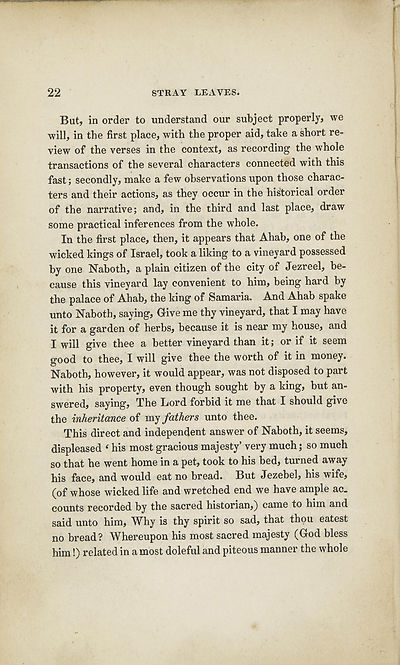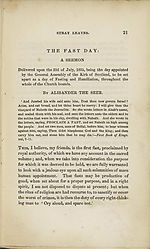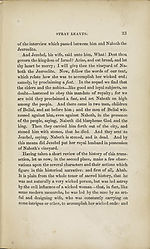Download files
Complete book:
Individual page:
Thumbnail gallery: Grid view | List view

22
STRAY LEAVES.
But, in order to understand our subject properly, we
will, in the first place, with the proper aid, take a short re¬
view of the verses in the context, as recording the whole
transactions of the several characters connected with this
fast; secondly, make a few observations upon those charac¬
ters and their actions, as they occur in the historical order
of the narrative; and, in the third and last place, draw
some practical inferences from the whole.
In the first place, then, it appears that Ahab, one of the
wicked kings of Israel, took a liking to a vineyard possessed
by one Naboth, a plain citizen of the city of Jezreel, be¬
cause this vineyard lay convenient to him, being hard by
the palace of Ahab, the king of Samaria. And Ahab spake
unto Naboth, saying, Give me thy vineyard, that I may have
it for a garden of herbs, because it is near my house, and
I will give thee a better vineyard than it; or if it seem
good to thee, I will give thee the worth of it in money.
Naboth, however, it would appear, was not disposed to part
with his property, even though sought by a king, but an¬
swered, saying, The Lord forbid it me that I should give
the inheritance of my fathers unto thee.
This direct and independent answer of Naboth, it seems,
displeased ‘ his most gracious majesty’ very much; so much
so that he went home in a pet, took to his bed, turned away
his face, and would eat no bread. But Jezebel, his wife,
(of whose wicked life and wretched end we have ample ac¬
counts recorded by the sacred historian,) came to him and
said unto him, Why is thy spirit so sad, that thou eatest
no bread? Whereupon his most sacred majesty (God bless
him!) related in a most doleful and piteous manner the whole
STRAY LEAVES.
But, in order to understand our subject properly, we
will, in the first place, with the proper aid, take a short re¬
view of the verses in the context, as recording the whole
transactions of the several characters connected with this
fast; secondly, make a few observations upon those charac¬
ters and their actions, as they occur in the historical order
of the narrative; and, in the third and last place, draw
some practical inferences from the whole.
In the first place, then, it appears that Ahab, one of the
wicked kings of Israel, took a liking to a vineyard possessed
by one Naboth, a plain citizen of the city of Jezreel, be¬
cause this vineyard lay convenient to him, being hard by
the palace of Ahab, the king of Samaria. And Ahab spake
unto Naboth, saying, Give me thy vineyard, that I may have
it for a garden of herbs, because it is near my house, and
I will give thee a better vineyard than it; or if it seem
good to thee, I will give thee the worth of it in money.
Naboth, however, it would appear, was not disposed to part
with his property, even though sought by a king, but an¬
swered, saying, The Lord forbid it me that I should give
the inheritance of my fathers unto thee.
This direct and independent answer of Naboth, it seems,
displeased ‘ his most gracious majesty’ very much; so much
so that he went home in a pet, took to his bed, turned away
his face, and would eat no bread. But Jezebel, his wife,
(of whose wicked life and wretched end we have ample ac¬
counts recorded by the sacred historian,) came to him and
said unto him, Why is thy spirit so sad, that thou eatest
no bread? Whereupon his most sacred majesty (God bless
him!) related in a most doleful and piteous manner the whole
Set display mode to:
![]() Universal Viewer |
Universal Viewer | ![]() Mirador |
Large image | Transcription
Mirador |
Large image | Transcription
Images and transcriptions on this page, including medium image downloads, may be used under the Creative Commons Attribution 4.0 International Licence unless otherwise stated. ![]()
| Selected 'Wee Windaes' books > Stray leaves from the portfolios of Alisander the seer, Andrew Whaup, and Humphrey Henkeckle > (48) |
|---|
| Permanent URL | https://digital.nls.uk/127593426 |
|---|
| Description | Items in Scots that have been selected by Scriever Hamish MacDonald from the National Library of Scotland's collections and digitised for the 'Wee Windaes' website. |
|---|---|
| Additional NLS resources: |
|

